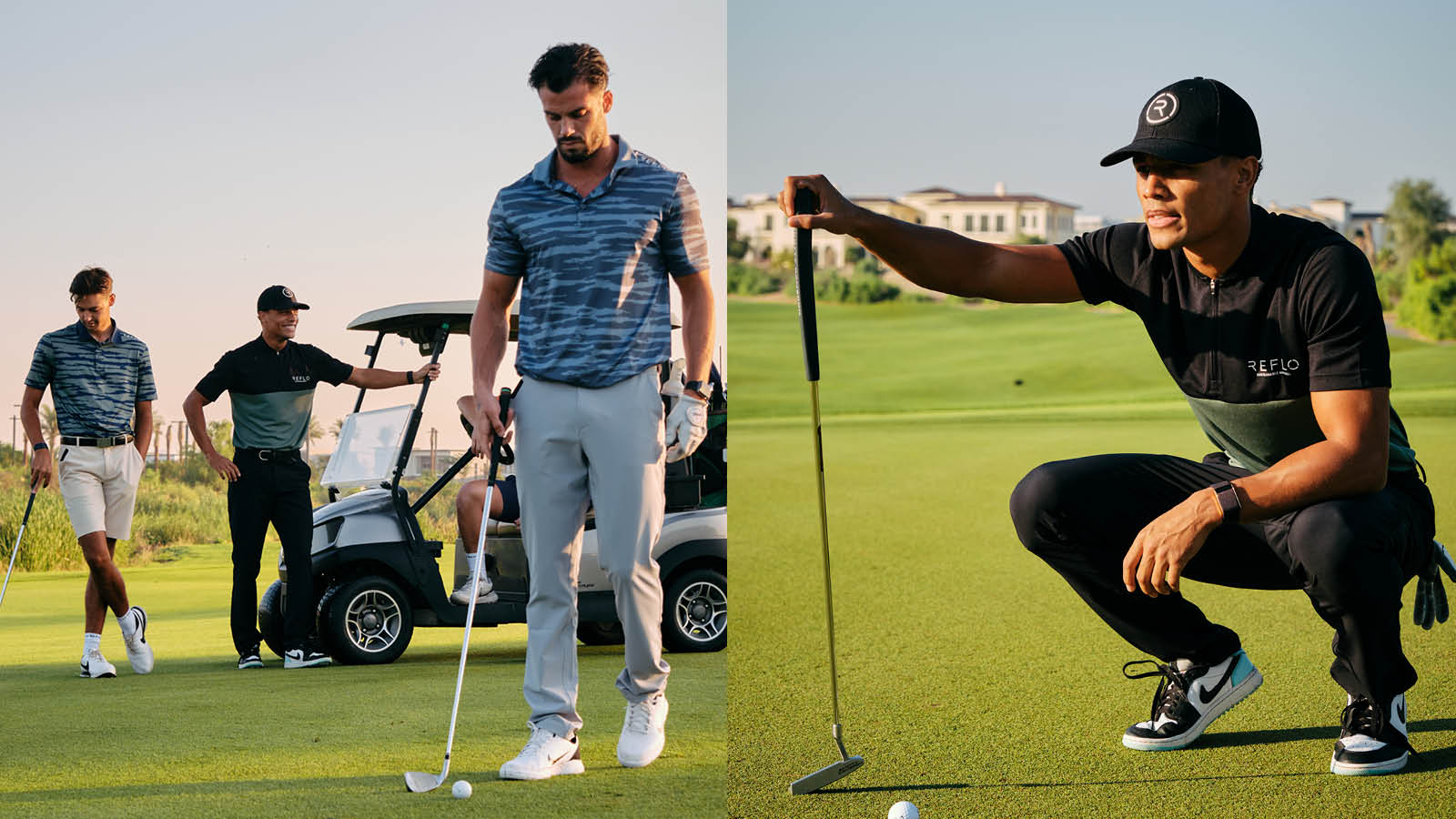'Our Aim Is To Be The Most Sustainable Apparel Brand In The World' – Meet The New Company Fighting Greenwashing And Exposing Organisations Who Use Sustainability As A 'Marketing Tool'
We sat down with Reflo founder Rory MacFadyen to talk about the genesis of his apparel brand and its quest to be an outright leader in sustainability and performance


Subscribe to the Golf Monthly newsletter to stay up to date with all the latest tour news, equipment news, reviews, head-to-heads and buyer’s guides from our team of experienced experts.
You are now subscribed
Your newsletter sign-up was successful
Want to add more newsletters?

Delivered daily
Daily Newsletter
Sign up for all the latest tour news, gear reviews, head-to-heads and buyer’s guides plus features, tips from our top 50 coaches and rules advice from our expert team.

Once a week
Kick Point
Sign up to our free Kick Point newsletter, filled with the latest gear reviews and expert advice as well as the best deals we spot each week.

Once a week
Women's Golf Edit
Sign up to our free newsletter, filled with news, features, tips and best buys surrounding the world of women’s golf. If you’re a female golfer, you won’t want to miss out!
Sustainability. A word next to 'meme', 'emoji' and 'vibes' that occupies a place almost exclusively in 21st century parlance. For new performancewear brand Reflo, the word sustainability is nothing short of the entire reason the brand came into existence. "Our aim is simply to be the most sustainable apparel brand in the world," Rory MacFadyen, Reflo's founder, told us when we sat down together at the end of last year. The brand is coming off the back of a busy January, having just announced Harry Kane as a golf ambassador and investor and launching an exclusive collection in partnership with the Waste Management Phoenix Open.
It's now no secret that our climate is changing rapidly and it's up to individuals and companies to find more sustainable ways of consuming and creating the products we use every day. Golfers, whose very hobby and profession is directly tied to an environment that allows them to safely play golf, have been given more and more options as the bigger brands in the game begin to adapt. However, MacFadyen wanted to start a movement from the ground up, with sustainability at the core rather than something to adapt to. In 2019 MacFadyen, whose background is in golf industry, went about figuring out how to make a truly sustainable apparel brand from the inside out.
"When we dug deeper into what an apparel brand is and how it functions, we saw some truly horrendous practices. Fabric dyeing techniques, cutting techniques, raw materials, shipping Italian fabrics to a Chinese factory then back to Europe and exploitation of cheap labour - this was the fast fashion race to the bottom. With that, 20% of clothing makes it into landfill before its even worn and it's not biodegradable, so it's going to be there forever. We thought there had to be a better way to do this, so we spent about three years researching how to do that."

Reflo founder Rory MacFadyen and Harry Kane in January 2024
"We built Reflo from the ground up with the North Star metric of sustainability. We didn't want to use sustainability as just simply a marketing tool, it had to be behind everything we did." It's sustainability credentials speak for themselves. Reflo's best selling products, like the Lapter hoodie, Congo polo and Tobol polo being made from 90%, 92% and 100% recycled polyester respectively. As part of its latest SS24 collection, the brand has introduced a system called Reloop, offering apparel that is made from 100% recycled materials while also being 100% recyclable. MacFadyen explained to us just how the system works.
"So, there's a QR code in the back of the neck that you scan and it'll take you to a Reflo landing page. After scanning the QR code, you enter your details and it will give you a place to ship it to. It comes back to us, where we manage the logistics around the recycling process. We design and make products that are recyclable, whilst working with our recycling partners, Plan B, to do the recycling itself, and Circular Textiles Foundation to ensure products meet all recycling standards."

Reflo's apparel extends beyond uses just for golf
"The clothes literally go through the same process as you would take a plastic bottle to be recycled. It goes through a machine that strips it down, heats it and turns it into pellets. Those pellets can be extracted and turned into a fabric again. So it's a fully closed-loop system, it's the first in golf and it's something we're incredibly proud of."
For Reflo, it's not just about the fabrics. "We plant a tree for every product sold, we have no single use plastics in our supply chain and the bags our clothes arrive in are fully biodegradable. We carbon offset our entire workforce, we only work with factories that ensure fair working conditions and wages." Currently, just one garment in the SS24 collection is part of the Reloop programme but that will increase to eight from the next autumn winter range.
Subscribe to the Golf Monthly newsletter to stay up to date with all the latest tour news, equipment news, reviews, head-to-heads and buyer’s guides from our team of experienced experts.
Sitting down and chatting with Rory over video call, it was clearly apparent how passionate he is about the practices of sustainability and making sure the brand sticks by them and improves on them as a matter of principle. In equal measure, when we got onto the conversation about how well the rest of the industry is adapting, his frustration at the glacial movement in some quarters was obvious.
"We see lots of big brands, both in the golf and apparel industry, talking about sustainability and it's purely a marketing tool for some of them. It isn’t a North Star metric. The other day, I won't mention a brand, I saw a polo shirt in a pro shop and it had a label on saying 'this is made from recycled material' then it turned out the polo shirt wasn't - it was made from virgin polyester - but it was only the swing tag that was the recycled product. It had no other purpose other than to green signal. I think that is a great way of looking at how the big incumbent brands operate. They have a very small percentage of their range that might contain sustainable or recycled content. I've seen products with as low as 10% recycled content in there as a ‘sustainable range'."

Golf Monthly tested two of Relfo's latest garments, the Lapter hoodie and Tobol polo. The quality and style stands up right next to the best in the industry.
MacFadyen is referencing what has become known as greenwashing. Greenwashing when a company gives off false impressions or misleading information about how its sustainable credentials. With an ever-growing demand in the market for sustainable products, some companies cut corners, mislead the public and in turn greenwash its products. Unsubstantiated claims, misleading labels, generic environmental imagery or hiding tradeoffs, companies that greenwash do more damage than good and, when found out, can mean consumers lose trust in those businesses that do employ proper green practices.
It's vital that the public call out greenwashing when they see it as well as doing the right research into purchasing 'green' products. Accreditations such as a B-Corporations (B-Corps), or using fabrics approved by the Global Recycling Standard (GRS) or fabrics that are Oeko-Tex certified are ways in which consumers can guarantee the products they are purchasing meet the green standards they promise. While Reflo is currently in the process of putting together it's B-Corp credentials that they hope to finish by the end of the year, all the fabrics used in the SS24 range are GRS and Oeko-Tex certified.
One battle for sustainable clothing companies is stressing that sustainable practices don't come at the sacrafice of performance, quality or comfort. From our testing of Reflo garments over the last 12 months, the performance holds up with the very best in the industry. "It's a genuine perception that a lot of sustainable clothing isn't as comfortable or good as the incumbent - so it was number one for us to make sure we didn't bring something to the market that fed into this preconception."

Reflo's apparel is wearable for multiple sports or physical activity. Having such versatility from one garment should allow people to buy less and wear more, thus reducing the amount of consumption.
"That's why it took us three years to launch because we spent a long, long time ensuring that our fabrics were as good, if not better than the incumbents. It's all well and good making these sustainable products, but if someone wears it once and never wears it again, it becomes part of the problem."
Floods, droughts and searing temperatures threaten the very game we love. While it may feel overwhelming to try and 'do your bit' as an individual in a world of 7 billion , it is relieving to see new brands appearing that allow consumers to make clear buying decisions that are better for the environment. Many point to larger corporations as the key drivers to moving our society in a more sustainable direction and if more brands start to appear with the same drive, passion and sustainable moral compass as Reflo has, we'll certainly start moving in the right direction. The brand has proven to the golf apparel world - and all fashion brands - that sustainability doesn't mean sacrificing performance, quality or style. No doubt, Reflo will be hoping it can be at the very forefront of leading the golf apparel industry into a more sustainable future.

Dan has been with the Golf Monthly team since 2021. He graduated with a Master's degree in International Journalism from the University of Sussex and looks after equipment reviews and buying guides, specializing in golf shoes, golf bags, golf trolleys, and apparel reviews. Dan is also a co-host of Kick Point: The Golf Gear Show. A left-handed golfer, his handicap index is currently 7.1, and he plays at Fulford Heath Golf Club in the West Midlands.
Dan's current What's In The Bag:
Driver: Cobra DS-Adapt X
Mini driver: TaylorMade R7 Quad Mini
Fairway: Ping G440 Max 21°
Irons: Titleist T250 (5), Titleist T100 (6-PW)
Wedges: Ping Glide Forged Pro (50, 56, 60)
Putter: TaylorMade Spider Tour X
Ball: Titleist Pro V1x
Grip: Golf Pride Tour Velvet
Bag: Vessel Sunday III